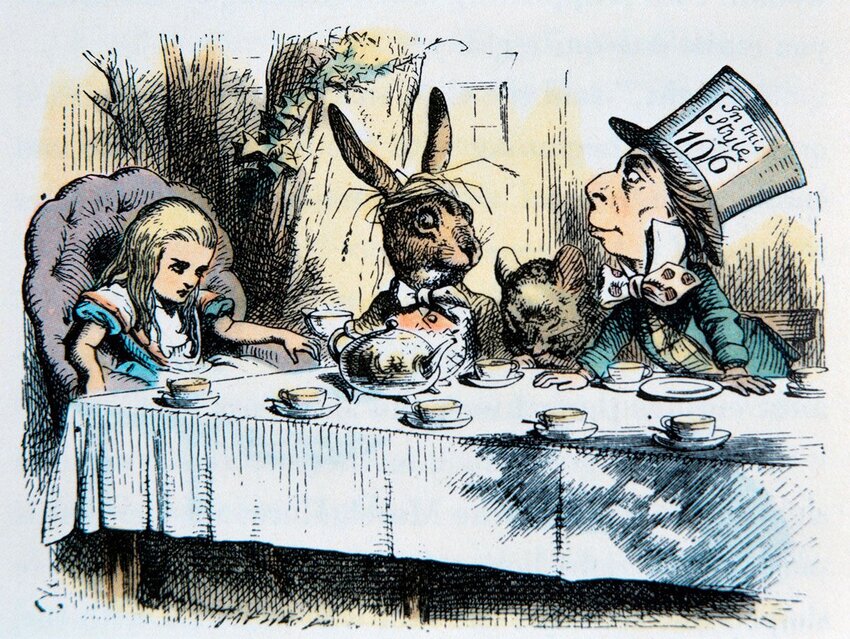British author Lewis Carroll was the first to use “portmanteau” — a noun for a large suitcase — to describe the linguistic quirk of blending two words to create a new word. In the 1871 novel Through the Looking-Glass, Carroll coined the descriptor “slithy” (lithe + slimy) and explained that the word was a “portmanteau” with “two meanings packed up into one word.”
Our modern lexicon is full of obvious portmanteaus, such as “athleisure” (athletic + leisure) and “brunch” (breakfast + lunch), but English also has more subtle combinations, such as the word “electrocute” (electricity + execute). From brand names to common verbs, there are a surprising amount of portmanteaus in our everyday vocabulary.
Stash (Stow + Cache)
The word “stash” originated in the late 18th century as a combination of the words “stow” and “cache.” “Stash” is a noun for something that is put away, hidden, or secretly stored, as in, “The pirates had a stash of gold.” Combining the root words “stow” (to put away) and “cache” (a hiding place) makes this perfectly sneaky portmanteau.
Velcro (Velour + Crochet)
“Velcro” is a brand name that has become genericized — that is, it’s part of everyday language (similar to Band-Aid, Kleenex, and Tupperware). But there’s a hidden meaning in its name. Inventor George de Mestral needed a catchy moniker for his 1950s two-sided textile creation. He combined the French words velour (velvet) and crochet (hook) for the Velcro name, which essentially means “hooked velvet.”
Hassle (Harass + Hustle)
Imagine the circumstance that was so annoying that a new word had to be created to describe it appropriately. “Hassle” is a relatively recent word that appeared in English around 1945. It’s a clever blend of “harass” (to exhaust, annoy, worry) and “hustle” (to swindle). It can refer to a skirmish, an argument, or an annoying/troublesome concern, as in, “This paperwork is such a hassle.”
Sitcom (Situation + Comedy)
For decades, sitcoms have been audience favorites for their easygoing, relatable comedy. The origins of this word are murky, but the first known use of “sitcom” was during the Golden Age of Television in the 1950s, when sitcoms including I Love Lucy and Leave It to Beaver were at the top of the ratings. Today’s streaming networks are home to another portmanteau, dramedies (dramas + comedies), which cover heavier material tempered by humor.
Splatter (Splash + Spatter)
By definition, this portmanteau does exactly what the root words suggest: “splash and scatter upon impact,” as in, “The ketchup splattered across the plate." This word dates back to the late 18th century and combines the older root words “splash” (to wet something by dashing it with liquid) and “spatter” (to scatter in small particles or drops).
Taxicab (Taximeter + Cabriolet)
Here’s a portmanteau and an abbreviation. “Cab” is a shortened form of “cabriolet,” a type of horse-drawn carriage. “Taximeter” refers to a device used to record the distance and fare of hired rides. The concept of hired rides in a “taximeter cab” was popularized in early 20th-century London, and the portmanteau “taxicab” was created almost immediately.
Pokémon (Pocket + Monsters)
This beloved video game franchise originated in Japan in 1996 under the name “Pocket Monsters.” The word “Pokémon” was created through a process called wasei eigo, or “Japan-made English,” which is when Japanese speakers create new Japanese words by using parts of existing English words. “Pocket Monsters” became poketto monsutā, which was shortened and combined into the portmanteau “Pokémon.”
Portmanteau (Porter + Manteau)
The word “portmanteau” itself is a portmanteau (and an autological word, which is a word that is what it describes). The oldest definition is “a large suitcase.” It comes from a blend of the French words porter (to carry) and manteau (a mantle or cloak).
Featured image credit: Glasshouse Images/ Alamy Stock Photo

